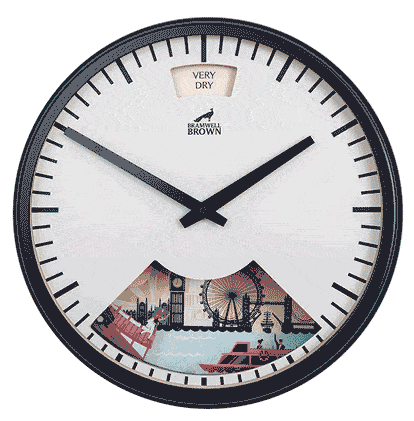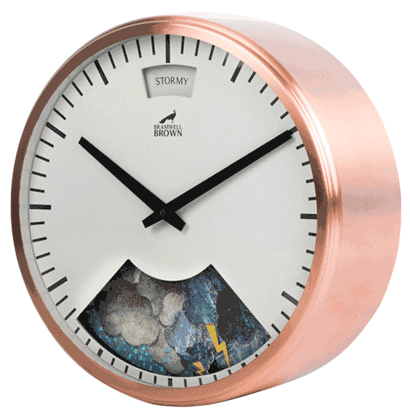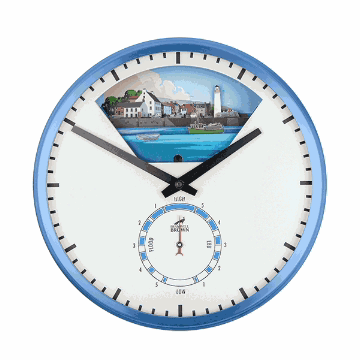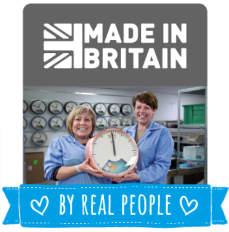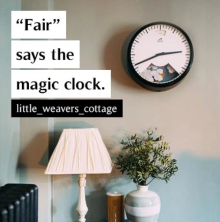The Bramwell Brown Blog
Ten Things We've Learnt in Ten Years of Making Clocks
We're celebrating 10 years of making clocks this summer. We can't quite believe how fast the time has flown. From the early concept drawings, our early prototypes and onto our various stages of business development, it's been quite the ride.
So here, perhaps in a cathartic way, are ten things (in no set order) that we feel we have learnt in the ten years that we have been designing and making our novel clocks, that we are very proud of.
1. Relationships matter - we like to be nice people

Over 10 years, if we think back to times when business conditions were most hard for us, if we hadn't genuinely cared for, and tended to, the relationships that we rely on for day-to-day operations, we probably wouldn’t still be here.
Our team, our suppliers, our advisors, have all, at one point or another, stuck with us, even when times have been hard or stressful.
We believe that one of the main reasons for this is that we care, beyond a business level, how people are and how their own businesses do. We have taken time to get to know all those who have worked with us.
Small things, like celebrating birthdays or taking interest in family and life events.
We plan to be around for many, many more years. And we truly think that the majority of the Bramwell Brown team will also be around for a long time if we continue to enjoy and care for our working relationships, share a mutual understanding of what is involved in the day-to-day and be sure to share some laughs along the way.
2. Shorter supply chains work well - British made is usually both easier to manage and better quality

When we first started, we had much of our supply chain based out of Asia. We didn’t know any other option. We presumed it was how product manufacturing was done.
Fast forward 10 years and we source the majority of our parts from UK or European-based suppliers.
Not only does this provide huge relief when we see ships run aground in the Suez Canal and cause massive issues for much of the economy, but the quality, that we rely on in every single clock, is far more reliable when parts are made closer to home.
Better quality clocks, shorter lead times on parts, faster prototyping and improvements to our designs. Just generally less stress for the team. Oh, and no more slightly terrifying lunches in remote China.
3. Our clocks are hard to make - and hard to copy

10 years ago, the clocks were designed on the back of a ‘design idea’. The idea being to reinvent barometric and tide indicators. Making them more exciting and combining them with a time-telling clock.
Like all start ups, naivety saved us.
Our designs are hugely complex and, if we had the same knowledge we do now, we are unsure if we would have bitten off such a technical engineering and manufacturing challenge, learning on the job - hanging on by our fingertips.
When we started we also had an obsession with design secrecy and Intellectual Property. Whilst we still care for (and invest in) this “IP”, we now feel that if a competitor ever wanted to try and ‘knock off’ one of our clocks, then good luck to them. They will also be faced with 10 years of steep learning, with a shorter term horizon than we have.
4. Our customers are lovely - we seem to be in a sweet spot of the population

We’re not quite sure how we’ve done it, but our customers really are a very nice bunch of people.
In a world of high volume consumerism, open public reviews and oft ‘get one over them’ attitudes, we are very infrequently faced with customers who are not lovely, or in the very least, understanding.
Perhaps the clocks are self-selecting? If you want to know the Weather or Tide, you could look at your phone. But if you are interested in the Weather and the Tide, or care for the world outside, or hand-made and long-life objects, then perhaps you’re not the type to demand a 100% refund if the postman delivers your clock on a different day to when they said they would.
We are all human over here at Bramwell Brown. Each and every customer interaction has the opportunity to make or break our day. And we’re so thankful that we seem to get such warm and positive correspondence from our customers.
Thank you to all of you who have ever contacted us and enjoyed the experience - the feeling will have been 100% mutual.
5. It’s a privilege to make and sell clocks when people place such significance on time-telling devices

As in point 3 above, our clocks were designed on the back of a product ‘idea’. By combining Weather or Tide-telling features with a clock, we felt we could offer something special.
But we didn’t take into account that clocks, in themselves, are already very special items, often summoning memories of specific loved ones.
The significance that people place on time-telling devices has come to intrigue and amaze us over the years. The special reasons for purchasing our clocks has, quite literally, blown us away at times.
Our Weather and Tide Clocks, like all good quality time-pieces, are a privilege to make and sell. And it makes us very proud to do make a product that people will treasure so dearly.
6. All businesses are different and comparing ourselves to other budding businesses is no fun

Being part of a business ecosystem is, of course, hugely helpful and important to us.
However, over the years, comparing ourselves to other online-facing businesses has come with its distractions.
Marketing techniques and strategies are especially varied between businesses. And when you are making such niche future family heirlooms, advice we receive on how to grow is often mismatched.
We run a very unusual business and our long term horizon is unique. Whilst there is overlap with many other wonderful businesses, some of the shiniest examples of ‘success’, would be foolish to attempt to emulate.
We now have a better understanding of what works or doesn’t work. And we won’t try and copy fast-growth-or-death business models that make us question if we are running a ‘successful’ business or not.
7. Never rush an engineering change to clock mechanics

Our Tide and Weather mechanisms are complex. The 100+ parts that go into each clock have small tolerances. One or two millimeters here and there, and a clock can behave differently to another clock next to it.
We have also found that altering single parts in our mechanism can have consequences elsewhere in the mechanics that cannot be conceived.
This has meant that our research and development has had to be done in small, if frequent, steps. Prototype parts tested over and over.
A deadline to have an engineering solution in place is always a daunting task and needs full commitment from the team. Never rush an engineering change.
8. People remember our clocks. For a long time.

We have understood for some time now that quite a few customers enthuse and lust after a Bramwell Brown a long time before ordering one.
House moves, job promotions, inheritances, good days, bad days etc, are all reasons for customers to decide ‘now is the time’ to order a clock from us.
We are lucky enough to have a product that people remember. And remember for a long time.
We like this because we’d hate to think our clocks are not “considered purchases”. They are lovingly designed and made so that, when they arrive on a customer’s wall, they are cherished and enjoyed for years and years.
9. Christmas and then January come around quickly

When we started the business, we didn’t think November and December would be such busy months for us each and every year.
That they are is no problem in particular but, like many retailers, it makes for a lot of work in a short period of time.
And prepping for the Christmas season, and looking forward to our own down-time with the family afterwards, can see November arrive so quickly, we are always taken aback.
In January, when we are faced with a new year in-tray that doesn’t relent, and so soon after the holidays, we’ve leant to carve out time to note down the lessons learned that season. Of which there are some, inevitably, every year.
10. Some of the best ideas are often the most original ones

We are always trying to come up with new ideas to excite and delight our customers.
How can we entertain with our communications, our unboxing, our product accessories or design updates.
Some of these ideas circle round and round but, often, the old ideas, that have been about for the longest, are the best.
Keeping past notebooks with all the old scribbles, drawings and jotted concepts are where some of our best ideas have been developed from over the years.
An idea conceived several years ago may make no sense at the time, but when viewed in thea different light of present day, can spark the most fun.
